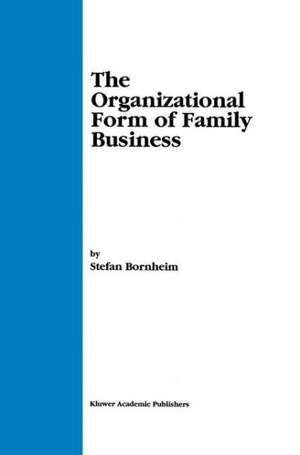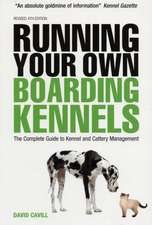The Organizational Form of Family Business
Autor Stefan Bornheimen Limba Engleză Paperback – 15 oct 2012
An introductory chapter is followed by a literature review, beginning with a review of family business research. This is followed by a discussion of family business definitional issues, and accompanied by some data to show the economic importance of family business.
There follows a review of the research literature on grounded theory, its developments, and its epistemological and ontological assumptions in the light of contemporary philosophy of science. A literature review and historical outline of organizational ecology including the theoretical achievements is provided. Also, the comparison with the other main organizational theories, justifying the theory selection, is offered.
| Toate formatele și edițiile | Preț | Express |
|---|---|---|
| Paperback (1) | 939.94 lei 6-8 săpt. | |
| Springer Us – 15 oct 2012 | 939.94 lei 6-8 săpt. | |
| Hardback (1) | 946.10 lei 6-8 săpt. | |
| Springer Us – 30 oct 2000 | 946.10 lei 6-8 săpt. |
Preț: 939.94 lei
Preț vechi: 1146.26 lei
-18% Nou
Puncte Express: 1410
Preț estimativ în valută:
179.87€ • 185.84$ • 149.62£
179.87€ • 185.84$ • 149.62£
Carte tipărită la comandă
Livrare economică 19 martie-02 aprilie
Preluare comenzi: 021 569.72.76
Specificații
ISBN-13: 9781461369516
ISBN-10: 1461369517
Pagini: 200
Ilustrații: X, 186 p.
Dimensiuni: 155 x 235 x 11 mm
Greutate: 0.29 kg
Ediția:Softcover reprint of the original 1st ed. 2000
Editura: Springer Us
Colecția Springer
Locul publicării:New York, NY, United States
ISBN-10: 1461369517
Pagini: 200
Ilustrații: X, 186 p.
Dimensiuni: 155 x 235 x 11 mm
Greutate: 0.29 kg
Ediția:Softcover reprint of the original 1st ed. 2000
Editura: Springer Us
Colecția Springer
Locul publicării:New York, NY, United States
Public țintă
ResearchCuprins
1. Introduction.- 1.1 Family Business.- 1.2 Grounded Theory.- 1.3 Organizational Ecology.- 1.4 The General Scope of this Research.- 1.5 Outlook.- 2. Literature Review.- 2.1 Family Business.- 2.1.1 Definitional issues.- 2.1.2 Statistics.- 2.1.3 Succession.- 2.1.4 International family business research.- 2.1.5 Entrepreneurship links.- 2.1.6 Strategy.- 2.1.7 Organizational behavior.- 2.1.8 Questions unanswered.- 2.2 Grounded Theory.- 2.2.1 Basic considerations.- 2.2.2 Some thoughts on the qualitative/quantitative dichotomy.- 2.2.3 Grounded theory in contrast to other methodological approaches.- 2.2.3.1 The inherent characteristics of qualitative research.- 2.2.3.2 The benefits of grounded theory.- 2.2.3.3 Triangulation.- 2.2.3.4 The use of cases and case studies.- 2.2.4 The hard core vs. the periphery.- 2.2.5 Some more philosophy of science.- 2.2.5.1 Sir Karl R. Popper.- 2.2.5.2 Thomas S. Kuhn.- 2.2.5.3 Paul K. Feyerabend.- 2.3 Organizational Ecology.- 2.3.1 Central themes.- 2.3.1.1 Adaptation and selection.- 2.3.1.2 Density dependence.- 2.3.1.3 Organizational foundings.- 2.3.1.4 Organizational mortality.- 2.3.1.5 Further categories of ecological research.- 2.3.2 Questions remaining.- 2.3.3 The fit of grounded theory and organizational ecology.- 2.4 The European Union.- 2.4.1 The institution and process of the European Union.- 2.4.2 Chronology of the Union.- 2.4.3 The history of the Union.- 2.4.4 The evolution of the European Union.- 2.4.5 The democratic foundations of the European Union.- 2.4.6 The single market in 1995.- 2.4.7 Small and medium-sized enterprises in the European Union.- 2.5 A Summary of Implications for this Research.- 3. Methodology.- 3.1 Formal Description.- 3.1.1 The procedure.- 3.1.2 The cases.- 3.2 Basic Grounded Theory Procedures.- 3.2.1 Theoretical sensitivity.- 3.2.2 The use of literature.- 3.2.3 Coding procedures in grounded theory.- 3.2.3.1 Open coding.- 3.2.3.2 Axial coding.- 3.2.3.3 Selective coding.- 3.3 The secondary data.- 3.3.1 The Interstratos project.- 3.3.2 The questionnaire.- 3.3.3 The data.- 3.3.4 Statistical techniques.- 3.3.5 Testing for assumption violations.- 3.3.5.1 Heteroskedasticity.- 3.3.5.2 Multi-Collinearity.- 3.3.6 Statistical procedures.- 3.4 The Utilization of Grounded Theory and Ecological Conjectures in Family Business.- 4. Results.- 4.1 Presentation of Cases.- 4.1.1 Austria (case A).- 4.1.2 Denmark (case D).- 4.1.3 Germany.- 4.1.3.1 Case G1.- 4.1.3.2 Case G2.- 4.1.3.3 Case G3.- 4.1.4 Sweden (case S1).- 4.1.5 Switzerland (case S2).- 4.2 The Model.- 4.3 The Core Elements as Found Embedded in the Case Data.- 4.4 The Statistical Analysis of the Interstratos Data.- 4.4.1 The hypotheses.- 4.4.2 Variables and proxy constructs.- 4.4.2.1 Hypotheses concerning the individual core elements.- 4.4.2.2 Hypotheses concerning the whole core model.- 4.4.3 Descriptive data set information.- 4.4.4 Results and presentation of the statistical analysis.- 4.4.4.1 1991 (IS91).- 4.4.4.2 1992 (IS92).- 4.4.4.3 1993 (IS93).- 4.4.4.4 1994 (IS94).- 4.4.4.5 1995 (IS95).- 4.4.4.6 Summary of significant results.- 5. Discussion.- 5.1 The Refined Model.- 5.1.1 Simplicity.- 5.1.2 Focus on core business.- 5.1.3 Dedication, enthusiasm and belief.- 5.1.4 Values and principles.- 5.1.5 Incentives and rewards.- 5.2 Validation of the Refined Model Through Interstratos.- 5.3 Caveats.- 5.4 Future Research.- 5.5 Summary and Concluding Questions.- 6. Bibliography.














